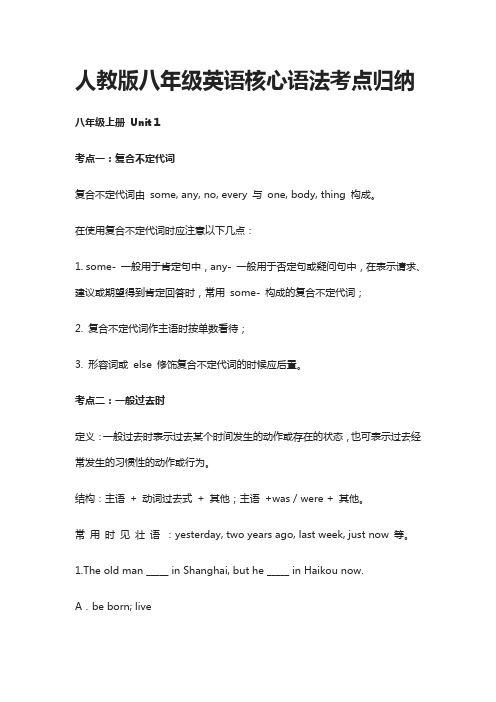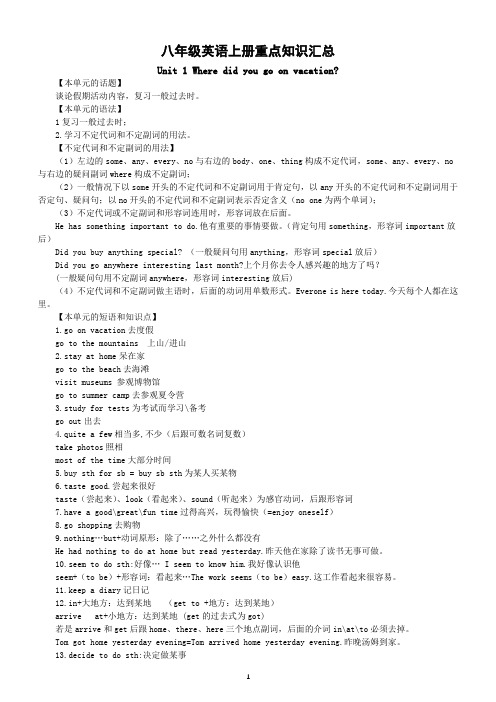人教版英语八年级上册不定代词
- 格式:docx
- 大小:18.08 KB
- 文档页数:5

人教版八年级上册英语知识点汇总资料Unit1 Where did you go on n?重点语法】不定代词:不指名代替任何特定名词或形容词的代词叫做不定代词。
用法注意:1.some和any +可数名/不可数名。
some多用于肯定句,any多用于否定句、疑问句和条件从句。
有些问句中用some,不用any,问话者XXX望得到对方肯定回答。
2.由some。
any。
no。
every与body。
one。
thing构成的复合不定代词作主语时,其谓语动词用三单。
3.不定代词若有定语修饰,该定语要置于其后:如:something interesting重点短语】1.buy XXX为某人买某物2.taste + adj.尝起来……3.nothing。
but + V.(原形)除了……之外什么都没有4.seem + (to be) + adj看起来5.XXX小地方到达某地6.XXX do sth.决定做某事7.XXX.尝试做某事/ try to do sth.尽力做某事8.XXX喜欢做某事9.want to do sth.想去做某事10.start XXX开始做某事=XXX.11.XXX停止做某事区分。
to do sth.停下来去做某事12.XXX XXX.不喜爱做某事14.so + adj + that +从句云云……以至于……16.tell sb。
(not) to do sth.告诉或人(不要)做某事17.keep XXX.连续做某事18.XXX.遗忘去做某事XXX遗忘做过某事词语辨析】1.XXX照相quite a few+名词复数“许多…”2.XXX形容词看起来…。
You seem happy today.XXX.好像XXX仿佛做某事I seem to have a coldIt seems +从句似乎。
….It XXX.seem like。
好像,似乎…。
It seems like a good idea.XXX小地点注:若后跟地点副词XXX,介词需省略,如:arrive here。

人教版八年级上册英语部分单词一、anyone /ˈeniwʌn/-解析:不定代词,意为“任何人”。
常用于疑问句和否定句中,也可用于肯定句,表示“随便哪个人”。
-例句:Is there anyone who can help me?(有谁能帮我吗?)二、anywhere /ˈeniweə(r)/-解析:不定副词,意为“在任何地方”。
常用于疑问句和否定句中,也可用于肯定句,表示“随便什么地方”。
-例句:I can't find my keys anywhere.(我在任何地方都找不到我的钥匙。
)三、wonderful /ˈwʌndəfl/-解析:形容词,意为“精彩的;绝妙的”。
通常用来形容事物非常好,令人赞叹。
-例句:We had a wonderful time at the party.(我们在聚会上玩得很开心。
)四、few /fjuː/-解析:形容词,意为“很少的;几乎没有的”,修饰可数名词复数。
表示数量很少,强调几乎没有的意思。
-例句:There are few people in the park today.(今天公园里人很少。
)五、quite a few-解析:意为“相当多;不少”,修饰可数名词复数。
强调数量比较多。
-例句:There are quite a few books on the shelf.(书架上有相当多的书。
)六、most /məʊst/-解析:形容词,意为“最多的;大多数的”;还可作名词,意为“大部分;大多数”。
-例句:Most students like sports.(大多数学生喜欢运动。
)七、something /ˈsʌmθɪŋ/-解析:不定代词,意为“某事;某物”。
常用于肯定句中。
-例句:There is something wrong with my bike.(我的自行车有问题。
)八、nothing /ˈnʌθɪŋ/-解析:不定代词,意为“没有什么;没有一件东西”。

人教版八年级英语核心语法考点归纳八年级上册Unit 1考点一:复合不定代词复合不定代词由some, any, no, every 与one, body, thing 构成。
在使用复合不定代词时应注意以下几点:1. some- 一般用于肯定句中,any- 一般用于否定句或疑问句中,在表示请求、建议或期望得到肯定回答时,常用some- 构成的复合不定代词;2. 复合不定代词作主语时按单数看待;3. 形容词或else 修饰复合不定代词的时候应后置。
考点二:一般过去时定义:一般过去时表示过去某个时间发生的动作或存在的状态,也可表示过去经常发生的习惯性的动作或行为。
结构:主语+ 动词过去式+ 其他;主语+was / were + 其他。
常用时见壮语:yesterday, two years ago, last week, just now 等。
1.The old man _____ in Shanghai, but he _____ in Haikou now.A.be born; liveB.was born ; liveC.is born; livesD.was born; lives2. —Where were you last Saturday?—I ____ in the Capital Museum.A. amB. will beC. wasD. have been八年级上册Unit 2考点一:拼读副词频度副词表示动作或行为发生的频率。
常见的频度副词及其发生的频率如下表:考点二:how 疑问词组练一练3.()do you usually go to school,Simon? -by bike.A.WhenB.HowC.WhatD.Where(答案在文末获取)八年级上册Unit 3考点一:形容词和副词的比较级形容词和副词的比较能表示两者之间的比较关系,表示A 比B 更……,通常用than 来连接。

八年级英语上册重点知识汇总Unit 1 Where did you go on vacation?【本单元的话题】谈论假期活动内容,复习一般过去时。
【本单元的语法】1复习一般过去时;2.学习不定代词和不定副词的用法。
【不定代词和不定副词的用法】(1)左边的some、any、every、no与右边的body、one、thing构成不定代词,some、any、every、no 与右边的疑问副词where构成不定副词;(2)一般情况下以some开头的不定代词和不定副词用于肯定句,以any开头的不定代词和不定副词用于否定句、疑问句;以no开头的不定代词和不定副词表示否定含义(no one为两个单词);(3)不定代词或不定副词和形容词连用时,形容词放在后面。
He has something important to do.他有重要的事情要做。
(肯定句用something,形容词important放后)Did you buy anything special? (一般疑问句用anything,形容词special放后)Did you go anywhere interesting last month?上个月你去令人感兴趣的地方了吗?(一般疑问句用不定副词anywhere,形容词interesting放后)(4)不定代词和不定副词做主语时,后面的动词用单数形式。
Everone is here today.今天每个人都在这里。
【本单元的短语和知识点】1.go on vacation去度假go to the mountains 上山/进山2.stay at home呆在家go to the beach去海滩visit museums 参观博物馆go to summer camp去参观夏令营3.study for tests为考试而学习\备考go out出去4.quite a few相当多,不少(后跟可数名词复数)take photos照相most of the time大部分时间5.buy sth for sb = buy sb sth为某人买某物6.taste good.尝起来很好taste(尝起来)、look(看起来)、sound(听起来)为感官动词,后跟形容词7.have a good\great\fun time过得高兴,玩得愉快(=enjoy oneself)8.go shopping去购物9.nothing…but+动词原形:除了……之外什么都没有He had nothing to do at home but read yesterday.昨天他在家除了读书无事可做。

1.3Grammar(一)一般过去时一般过去时表示过去某个时间发生的动作或存在的状态,也表示过去经常或反复发生的动作。
其结构为:a.主系表主语+was/were+其他.b.主谓宾主语+谓语动词(过去式)+宾语.☞—What did you do yesterday?昨天你做了什么?—I went swimming.我去游泳了。
☞When I was at middle school,I often went to school by bike.我读中学时经常骑自行车去学校。
1.一般过去时的基本结构①实义动词肯定句:主语+动词过去式+其他.☞I went to the cinema yesterday.我昨天看了电影。
否定句:主语+didn’t+动词原形+其他。
☞I didn’t go to the cinema yesterday.我昨天没看电影。
一般疑问句及其回答:Did+主语+动词原形+其他?肯定回答:Yes,主语+did.否定回答:No,主语+didn’t/did not.☞—Did you go to the cinema yesterday?你昨天去看电影了吗?—Yes,I did./No,I didn’t.是的,我去了。
/不,我没去。
特殊疑问句:特殊疑问词+did+主语+动词原形+其他?☞—Where did you go yesterday?你昨天去哪儿了?—I went to the cinema yesterday.我昨天去看电影了。
②be动词肯定句:主语+was/were+其他.☞I was at home yesterday.我昨天在家。
否定句:主语+wasn’t/weren’t+其他.☞I wasn’t at home yesterday.我昨天没在家。
一般疑问句及其回答:Were/Was+主语+其他?☞—Were you at home yesterday?你昨天在家吗?—Yes,I was./No,I wasn’t.是的,我在家。

复合不定代词(some-, any-, no-, every- 加-one, -body, -thing, -where)-one(人-不与of连用) -body(人) -thing(事物)-where(地方)(某一/些)somesomeone somebody something somewhere(任何)anyanyone anybody anything anywhere(不/无)nono one nobody nothing nowhere (每一/每一)everyeveryone everybody everything everywhere some one/any one/every one---人/物+of 用法1、相当于名词,可作主语、宾语和表语练习:(1)世上无难事,只怕有心人。
Nothing is difficult if you put your heart into it.()(2)今天我没有什么可讲的。
I have nothing to say. ( )(3)没什么。
That is nothing. ()2.复合不定代词作主语时,其谓动三单。
Nobody know s him.Everyone is on vacation.练习:练一练我的手表出了点毛病。
Something ____ (is/are) wrong with my watch.是的,每个人都想赢。
Well, everyone ______ (want) to win.3.修饰词前(不定代词+形容词/to do/else)Did you do anything special on vacation?I have something interesting to tell you.Would you like something to eat?There is something else.练习:练一练这本书里有什么新东西吗?Is there _________ _____ in this book?今天没有什么特别的事。
Unit 1 核心语法知识点一、不定代词1.不定代词是不指明代替任何特定名词或形容词的代词。
常见的不定代词有some,any, no, every, each, both, all, little, few, a little, a few, other, another等。
2.some和any既可以修饰______________,也可以修饰______________。
但是some常用于_____句, any则多用于_____句、_____句和条件状语从句。
例如:→A: Is there _____ water in the bottle?B: Yes, there is _____ water. / No, there is not _____ water.3.但是在would you like some water?这类问句中用_____而不是用_____,因为问话者希望得到对方肯定的答复。
4.many, much, a lot of均表示“很多”。
但是many只修饰______________, much只修饰_______________, 而a lot of既可接____________,又可与__________连用。
5.few与a few是一对反义词,修饰____________;little和a little也是一对反义词,修饰___________。
few和little侧重于_____的概念,意思为_________,而a few和a little侧重于______的含义,意为__________。
→翻译Few students know what happened./ There is a little time to go.6.复合不定代词是由some-, any-, every-, no-, 加上-one, -body, -thing等所组成的不7.语动词用单数第三人称形式。
初中英语学习资料madeofjingetiejiUnit1 复合不定代词精讲及考点分析沂水县实验中学孟祥敏复合不定代词的组成:复合不定代词是由 some, any, no, every 加 -body,-thing,-one 组成,列表以下:Somebody 某人Anybody 任何人Someone 某人Anyone 任何人Something 某物,某事Anything 任何事物Nobody 没有人Everybody 每人No one 没有人Everyone 每人Nothing 没有东西Everything 全部因为在使用中有比较特别的习习用法,是考试中比较常有的考点。
一:复合不定代词和部分否认部分否认是考试中的热点考点,常表达的构造有两种:1:not+所有一定词2:助动词+not+ 所有一定词。
其意都为“并不是都,不都”。
前者是一般形态,如:Not everyone likesEnglish. 因为是基本观点,学生比较简单理解。
但后者和一般否认句比较相像,简单惹起学生判断上的迷惑,是出题的焦点。
1. I agree with most of what you said, but I don’ t agree with ______.A. everything B: anything C. something D. nothing剖析:有同学看到I don ’t agree就判断能否认句,选B, anything .这就是对句子理解出现了偏差。
句意是:我赞同你所说的大多数,但不是所有。
是一句典型的部分否认形式。
not everything 的构造表示“并不是每件事”。
因此正确答案是 A. everything。
2. ----The exam was di fficult, wasn’ t it?---- No, but I don’ t think ______ could pass it.A. somebodyB. anybodyC. nobody D everybody分析:同上题一样,不能将I don’t think简单得看成否定句而选 B. anybody 。
一复合不定代词不指明代替任何特定名词或形容词的代词叫不定代词,它们有some, any, much, many等以及由every-, some-, any-, no-加上-thing, -body, -one构成的复合不定代词。
下面我们主要学习有关复合不定代词的内容。
1、复合不定代词的分类指物:everything, something, anything, nothing指人:everybody, somebody, anybody, nobody everyone, someone, anyone, no one2、复合不定代词的用法1. ◆some-类的复合不定代词一般用于肯定句中。
如:There is somebody at the door.◆any-类的复合不定代词一般用于否定句或疑问句中,表示“某事;某物;某人”;也可用于肯定句或条件从句中,表示“任何东西;任何人”。
如:There isn't anything in the box.Did you see anybody there?If anybody comes here, please ask him to wait.2. 复合不定代词作主语时,谓语动词常用单数形式。
如:Everybody knows he sings well.3. 复合不定代词若有定语(形容词或不定式)修饰时,定语要放在其后。
如:There's nothing new about this.I want something to eat.【运用】单项选择1. —Who taught Zhu Zhiwen to sing?—________! He learned singing by himself.A. EverybodyB. SomebodyC. Nobody2. There is ________ wrong with my back and it hurts seriously.A. anythingB. somethingC. nothing3. I always believe that ________ is difficult if we try our best to do it.A. somethingB. anythingC. everythingD. nothing4. —Would you please tell me ________ in today's newspaper?—Sorry, I haven't read it yet.A.something importantB. important somethingC. anything importantD. important anything5. —Is there ________ in today's newspaper?—Yes. A terrible accident happened in Hubei.A. special somethingB. anything specialC. something special6. When our teacher heard of the news, he was too angry to say ________.A. everythingB. nothingC. somethingD. anything二频度副词频度副词表示事情发生的频率。
人教版八年级英语上册语法总结一、一般现在时。
1. 概念。
- 表示经常或习惯性的动作或状态;表示客观事实或普遍真理。
- 例如:I often get up at six o'clock.(经常的动作)- The earth goes around the sun.(客观真理)2. 动词形式。
- 当主语是第三人称单数(he/she/it等)时,动词要加 -s或 -es。
- 一般情况加 -s,如:like - likes;以s, x, ch, sh, o结尾的动词加 -es,如:go - goes, watch - watches;以辅音字母 + y结尾的动词,把y变为i再加 -es,如:study - studies。
- 当主语不是第三人称单数时,动词用原形。
例如:They play football every day.3. 句型结构。
- 肯定句:主语+动词(原形/第三人称单数形式)+其他。
- 否定句:主语+don't/doesn't+动词原形+其他。
(do not = don't,does not = doesn't)- 一般疑问句:Do/Does+主语+动词原形+其他?回答:Yes, 主语+do/does. No, 主语+don't/doesn't.二、一般过去时。
1. 概念。
- 表示过去某个时间发生的动作或存在的状态。
- 例如:I went to the park yesterday.2. 动词形式。
- 一般动词在词尾加 -ed,如:play - played;以不发音的e结尾的动词加 -d,如:live - lived;以重读闭音节结尾且末尾只有一个辅音字母的动词,双写这个辅音字母再加 -ed,如:stop - stopped;以“辅音字母 + y”结尾的动词,把y变为i再加 -ed,如:study - studied。
还有一些不规则动词,如:go - went, see - saw等。
不定代词1. I have two skirts . One is red , is blue .A. the otherB. othersC. otherD. another2. There wrong with my car .A. are somethingB. are anythingC. is anythingD. is something3. I’m free today . I haven’t to do .A. somethingB. everythingC. nothingD. anything4. Her parents are doctors .A. eachB. allC. bothD. no one5. Of the three foreign friends , one is from London, two are from New York .A.otherB. the otherC. othersD. the others6. I want to have a word with Tom . I have to tell him .A.important somethingB. nothing importantC. anything importantD. something important7. There wrong with the machine .A. aren’t somethingB. aren’t anythingC. isn’t somethingD. isn’t anything8. My parents and I are interested in music .A. bothB. allC. neitherD. no9. Look at those students . Some are cleaning the window , are sweeping the floor .A. the otherB. otherC. othersD. the others10. You may keep the book for two weeks , but you mustn’t lend it to .A. otherB. othersC. the othersD. the others11. I study Chinese , English and some subjects .A. otherB. the otherC. othersD. the others12. Do they often talk to each in English ?A. othersB. the otherC. OtherD. the others13. Would you like milk ?A. someB. anyC. littleD. a few14. Mary sings better than of he girls in her classroom . She sings best .A. someB. anyC. mostD. one15. All the students had gone out . There was in the classroom .A. somebodyB. anybodyC. nobodyD. everybody16. Now , is here . Let’s begin our meeting .A. AnybodyB. EverybodyC. NobodyD. Anybody17. has taken my pencil by mistake . I can’t find it .A. SomebodyB. EverybodyC. NobodyD. everybody18.Did they find in the garden ?No , they found there .A.anybody , nobodyB. somebody , everybodyC.anybody ,somebody D. everybody , anybody19. She made mistakes in her exercises .A. anyB. anotherC. noD. one20. There are fifty pupils in their class . of them are League members .A. BothB. EitherC. AllD. No one21.The students have on Sunday .A. no any classB. not classC. no classesD. no any class22. There isn’t on playground .A. anyoneB. everyoneC. nobodyD. any people23. If you need a rubber , I’ll lend you .A. someB. oneC. anotherD. the one24. We have books to read .A. manyB. muchC. a lotD. any25. We study Chinese , English and some subjects .A. otherB. othersC. the otherD. the others26. is here today except Li Ping .A. AnybodyB. EverybodyC. SomebodyD. Nobody27. Is there in the library ? Yes, is in .A. somebody , anybodyB. anybody , nobodyC. anybody , somebodyD. anybody , everybody28. I was too tired to do work .A. someB. anyC. eachD. either29. I don’t like this one . Would you please show me one .A. otherB. the otherC. anotherD. others30. Mike is stronger than in his class .A. any boysB. any boyC. any other boyD. other boy31. The farmers are very glad to have apple harvest .A. otherB. the otherC. anotherD. others32. of the books is yours . They are mine .A. BothB. EitherC. AllD. Neither33. He is lazy .He never does work .A. ManyB. noC. someD. any34. I invited Tom and Ann to dinner , but of them came .A. neitherB. bothC. eitherD. none35. He is busy . He has got work to do .A. someB. anyC. noD. a few36. Would you like some wine ? Yes . Just .A. littleB. very littleC. a littleD. little bit37. Is here? No, Bob and Tim have asked for leave.A. AnybodyB. somebodyC. everybodyD. nobody38. The days in summer are longer than in winter .A. thatB. oneC. thoseD. these39. If you want a ticket for a round-trip, sir, you’ll have to pay____$80.A. anotherB. otherC. othersD. the other参考答案:1---5 ADDCB 6---10 DDBCB11---15 ACABC 16---20 BAACC21---25 CABAA 26---30 BCBCC31---35 CDDAA 36---39 CCCA。